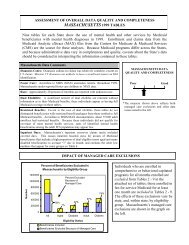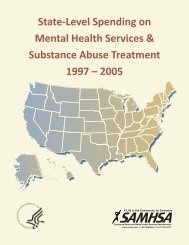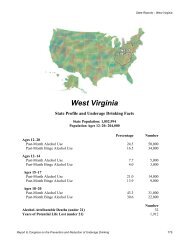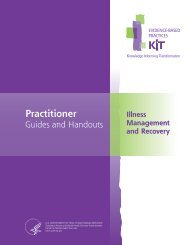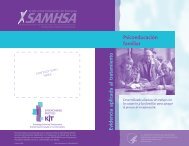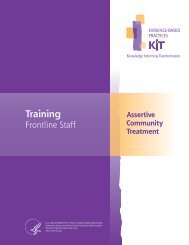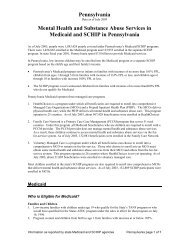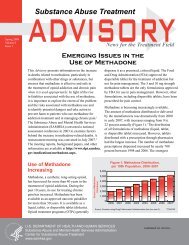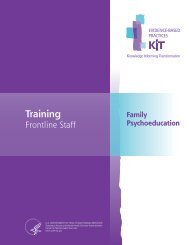Evaluation Findings - SAMHSA Store - Substance Abuse and Mental ...
Evaluation Findings - SAMHSA Store - Substance Abuse and Mental ...
Evaluation Findings - SAMHSA Store - Substance Abuse and Mental ...
You also want an ePaper? Increase the reach of your titles
YUMPU automatically turns print PDFs into web optimized ePapers that Google loves.
How Well Are Communities<br />
Implementing Evidence-Based<br />
Practices<br />
Reflecting <strong>and</strong> increased focus on the<br />
changes that have occurred within systems<br />
of care at the practice level, the<br />
implementation of evidence-based <strong>and</strong><br />
promising practices within systems of care<br />
was examined beginning with communities<br />
initially funded in 2005 <strong>and</strong> 2006.<br />
Widespread Use of a Diverse Array of<br />
Evidence-Based Practices Was<br />
Found in Systems of Care<br />
There is widespread use of a broad array of<br />
evidence-based <strong>and</strong> promising practices in<br />
the treatment of children/youth served<br />
within systems of care.<br />
In communities initially funded in 2002–<br />
2004 (Evidence-based Treatment Survey):<br />
<br />
<br />
<br />
<br />
Broad support for evidence-based<br />
treatments was found.<br />
A wide range of evidence-based <strong>and</strong><br />
promising practices was included in the<br />
array of clinical services provided within<br />
systems of care. The communities<br />
identified 50 evidence-based practices<br />
that are provided; 12 of these were<br />
offered by more than one community, as<br />
shown on Table 6.<br />
Systems of care were adapting evidencebased<br />
practices to respond to identified<br />
cultures within their communities,<br />
including racial/ethnic diversity,<br />
geographical location, literacy level,<br />
socioeconomic status, individualization,<br />
<strong>and</strong> time constraints.<br />
Service providers reported being less<br />
adaptable <strong>and</strong> less willing to try new<br />
ideas <strong>and</strong> practices than administrators,<br />
highlighting the need for education,<br />
training, coaching, <strong>and</strong> other approaches<br />
to improve practice.<br />
Table 6: Evidence-Based Treatments Used in Systems of Care<br />
Practice<br />
Number of Communities That Use or Plan To<br />
Use the Practice<br />
Wraparound Process 12<br />
Positive Behavioral Interventions <strong>and</strong> Support 8<br />
Multisystemic Therapy 7<br />
Cognitive Behavioral Therapy (CBT) 6<br />
Trauma-Focused CBT 6<br />
Parent–Child Interaction Therapy 5<br />
Incredible Years Program 4<br />
Family Group Decisionmaking 3<br />
Functional Family Therapy 3<br />
Parent Management Training–Oregon Model 3<br />
Dialectical Behavior Therapy 2<br />
Therapeutic Foster Care 2<br />
The Comprehensive Community <strong>Mental</strong> Health Services for Children <strong>and</strong> Their Families Program <strong>Evaluation</strong> <strong>Findings</strong><br />
2006–2008 Annual Report to Congress ● Page 29



